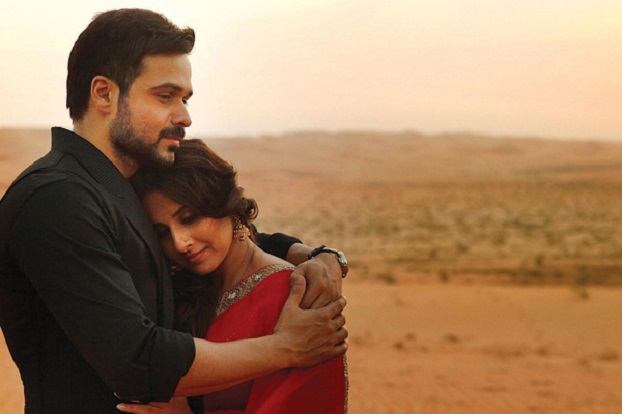
So far 2015 is shaping up to be the year of the heroic heroine with films like NH10, Dum Laga Ke Haisha, Piku, and Tanu Weds Manu Returns featuring women who, bluntly put, are bad-ass. While strong, patriarchy-busting central female characters may seem like a recent phenomenon, actress Vidya Balan paved the way for such characters by playing brave women, with much bravado, in 2011’s The Dirty Picture and 2012’s Kahaani. Sadly, Hamari Adhuri Kahani (Our Unfinished Story) won’t be part of the heroic heroine roster, as a godawful screenplay ruins any chances of an engaging story and/or excellent performances.
Vasudha Prasad (Vidya Balan) can be best described as the quintessential dukhiyari. The dukhiyari has a golden albeit broken heart, stoically carries the burdens of the oppressed Indian woman and when shown the slightest bit of kindness, floods the frame with copious tears. Vasudha’s domineering husband Hari (Rajkummar Rao) mysteriously leaves after a year of marriage but five years after his disappearance, she’s still tortured by his memories and builds a mental prison for herself.
To support her young son, Vasudha works as a florist and while creating a bouquet at a hotel, catches the eye of business magnate Aarav Ruparel (Emraan Hashmi). The beauty of her arrangements and the pathos in her voice are enough for Aarav to fall madly in love with a fellow tortured soul, putting Vasudha in a bind. She’s tied to her husband by tradition and guilt, but can admiration and praise from another man unravel the matrimonial knot? Just as the leading lady imagines a blissful future with Aarav, Hari re-enters her life.
The Good
Cinematography: The romance the leading couple couldn’t create was accomplished by sunsets in the Abu Dhabi desert. If only there were more opportunities in the movie for the Director of Photography to showcase his talent!
The Bad
Writing: Much is expected from Shagufta Rafique, and especially Mahesh Bhatt who are seasoned professionals in their own right. Unfortunately, amateur gaffes are aplenty: the film is narrated by Hari and how he knows the intimate details of Vasudha and Aarav’s romance is anyone’s guess. Despite his absence, Vasudha feels inseparable from Hari yet abandons her son for a job opportunity in Dubai, hardly mentioning him after the fact.
The writers declare women are goddesses and should no longer aspire to be tormented Sita of the Ramayan and instead embrace their inner Radha. But the female central to the plot is powerless and more of a possession than a person: Hari sees her as property and to Aarav she’s proof of him conquering childhood trauma (and an opportunity to flex his influence and wealth). Rafique and Bhatt demand the audience sympathize with the leading lady but the indecisive, weepy Vasudha becomes frustrating and even annoying. Do direction and editing appear sub par because of the terrible screenplay? Absolutely.
Background Score: Giving the background score the sole responsibility of bringing intensity to a scene is an admission of guilt by the filmmaker; that what solid writing and believable acting couldn’t accomplish, hopefully score will. Here the score is used as a cue for the audience to gasp in horror, cry, and essentially feel what the characters describe, not what they enact. Crescendos are blaring, glaring and aplenty.
Ruparel’s Assistant: Aarav Ruparel’s right hand man Apoorva (Prabal Panjabi) becomes an unintended source of laughs. The assistant is a faithful and obedient attendant, present in almost every scene with the business tycoon, yet his sole duty is announcing whether Aarav is late for a flight (with annoyance ever present on his face). For a character to be given much footage but made of little use, deserves special mention!
The So-So
Soundtrack: If anyone knows music, it’s film director Mohit Suri. Starting from Zeher (2005) to recent chart-topping behemoths Aashiqui 2 (2013) and Ek Villain (2014) the man knows the power of melody. The songs in this movie are not bad, but in all fairness deserve Side B of the aforementioned soundtracks.
Dialogues: There are a few nice one-liners which give the impression that this feature film was created just so they could be showcased. Had the screenplay been well-written the dialogues would have left more impact, but instead they become nothing more than flowers on a grave.
Acting: Balan, Hashmi and Rao are talented artists but have no scope to prove their mettle in a mess of a film. Character motivation is unclear, actions are illogical and to compensate for these shortcomings, the film turns up the volume on histrionics. There are glimmers of talent from the trio, but the shoddy writing quickly casts its dark shadow.
Two scenes unintentionally slap the viewer across the face. Hashmi slowly swaggers toward Balan, she clad in her signature sari, and they gently embrace each other in the solitude of desert dunes. The scene is heart-wrenching because it closely resembles a moment from The Dirty Picture and the audience becomes acutely aware of losing two hours in hopes of the magic from that biopic being recreated.
The other scene involves Balan walking through a Durga Puja procession in the streets of Kolkata, which right away evokes the climax of Kahaani. Here the movie-goer is powerfully made aware of a tragic fact: Hamari Adhuri Kahani has reduced the triumphant goddess of Kahaani to a clichéd, pitiful dukhiyari.
* * *
Shivani cannot remember a time when she wasn’t madly in love with Indian cinema, which now inspires much of her writing. She lives in both New York City and Twitterpur at @Shivani510.













Hi Shivani!
Thank you for your review. I too get tired of the never ending sob story and cliche. Based on your review I will not be seeing this latest film. I was expecting more from Vidya Balan.